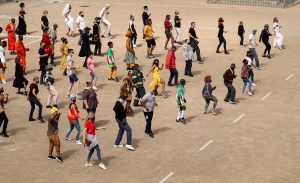
The pandemic’s determination and tenacity to continue its global spread has created a numbness and dulled us to sleep. A general fatigue has expanded throughout humanity, so the urge to find any source of contentment is only natural. Recently, a song in the Zulu language came along with a message of hope—Jerusalema—which transformed into a collective dance that has taken the world by storm. Its wildfire spread shows how eager people are to connect. Now the question is how can that feeling of connection be elevated to a higher level of unity, one that surpasses our physical actions and the distances between us to give lasting joy.
Some of my students asked me about the global sensation “Jerusalema,” explaining that the South African theme became a lockdown anthem as group dances spread in every part of the planet to uplift the spirit during Covid-19 restrictions. My response is that dancing, especially in a group, is a positive activity as it gives a sense of togetherness. At the same time, humanity’s state of desperation will still be waiting to resurface as soon as the contagious beats die down and everyone returns to his own place and concerns about the uncertain future.
In other words, a group activity for entertainment will act as a sort of therapy and escape from reality, but it won’t allow us to close our eyes like scared children without sharpening our minds with meaningful questions about what the tiny virus is trying to teach us. The pandemic calls for a deeper scrutiny of the state of the world, what we have wrongly built until now, and what needs to be flipped for humanity’s betterment—that the virus is stirring up the need for connection between us toward the goal of a better life.
Interestingly, the song’s theme of Jerusalema as home, as a special place in life, can be explained with a profound perspective from the wisdom of Kabbalah. In the Ari’s book The Tree of Life, it is written that if a person reaches the revelation of the upper force through the right attitudes of love and bestowal toward others, he discovers a special quality called “Jerusalem,” which refers not to a physical place but to a state of perfect unity.
Therefore, today’s Jerusalem, which is a holy city for the three major world religions, is not the real Jerusalem written about by prophets and sages. Jerusalem (Yerushalayim) represents the “perfect city” (Ira Shlemah) in which we all achieve perfection in the relationships between us, complementing each other. We discover a fresh new purpose to our lives as we come closer to each other in our thoughts and feelings of mutual care and empathy. We align ourselves with the perfect global interconnectedness and reciprocity existing in nature.
Jerusalem is the heart, the center of the world, the epicenter of all desires and aspirations, a state in which everything is based on mutual love for one another. When we reach such a state through the connection of our hearts, we will not only activate new sensations of livelihood, high spirits and energy, we will also attain boundless and eternal joy.
Featured in Facebook, KabNet, LinkedIn, Medium, The Times of Israel, Thrive Global